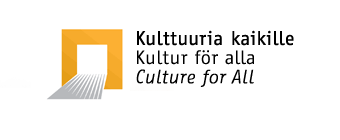
Seminar about accessibility and cultural heritage 23.3.2010
Seminar in English about accessibility and cultural heritage at the Tampere University of Technology, School of architecture on Tuesday, March 23, 2010
- 12.00-17.00 Seminar in English, Auditorium RG202
- 9.15-11.00 Demonstrations in Finnish: impaired vision, hearing and mobility, Hall RO107
Seminar is free and open to everyone.
Registration by March 18, 2010: anna.helamaa(at)tut.fi
Program
9.15-11.00 Demonstrations in Finnish, Hall RO107
---
12.00-12.15 Opening words
Markku Hedman, professor, TUT School of Architecture
12.15-13.15 Architecture, history, art… and life..
Miquel Usandizaga, professor, Polytechnic University of Catalonia
13.15-14.15 ..And the nature of a good life
Marta Bordas, architect, researcher, Polytechnic University of Catalonia
14.15-14.45 Coffee
14.45-15.15 Why accessibility: for the users or for the building licence authorities?
Kirsti Pesola, architect, The Central Union for the Welfare of the Aged
15.15-15.45 From invincible to accessible, historic sites in Finland
Selja Flinck, Senior Advisor, National Board of Antiquities
15.45-16.45 Rehabilitation, safety and senses for an inclusive build space
Carlos Mourão Pereira, architect, researcher, Carlos Mourão Pereira Arquitecto
16.45-17.00 Closing words
Olli-Paavo Koponen, professor, TUT School of Architecture
Speakers
Marta Bordas Eddy
Marta Bordas Eddy was born in Barcelona, in 1981. Graduated in Escola Tècnica Superior d´Arquitectura del Vallès of Universitat Politècnica de Catalunya with special distinction in 2007.
Currently, in the same institution, develops her Ph.D. Thesis in Architecture, attached to the Architectonical Composition Department, where collaborates with the research group ‘Urban Perspectives: Processes and Projects´.
Has participated, with the support of the Chair of Accessibility from the same University, in studies and plans of accessibility for an inclusive environment and in the redaction of guides for an inclusive teaching. Some research has been published and received special mentions.
She is coordinating the Erasmus Intensive Program ‘Let´s Open Cities for Us´ (IP-LOCUS), from 2007 to 2010. It was conceived as a pioneer study on accessibility and inclusive design for the suppression of architectonical barriers in the constructed environment, especially in historical cities with relevant heritage and steep topography. The program has been presented in local and international seminars and conferences.
Carlos Mourão Pereira
Carlos Mourão Pereira was born in Lisbon, in 1970. Graduated in Faculdade de Arquitectura of Universidade Técnica de Lisboa, distinguished with the prize Comendador Joaquim Matias, in 1997.
Started the activity in 1991, and worked in Lisbon, with Aires Mateus, Carrilho da Graça, Costa Cabral and Gonçalo Byrne, in Zurich, with Toni Geser, and in Genoa, with Renzo Piano. He has been working in his own office since 1998, having his projects published and presented in seminars and conferences, in European universities, in the Metropolitan Museum of Art in New York., in the world exhibition, in Saragossa and in the Hungarian Contemporary Architecture Center, in Budapest.
He taught Studio in the Architecture Course of the Universidade de Arquitectura da Beira Interior, in Covilhã, between 2005 and 2006, and in the Master in Architecture of Instituto Superior Técnico in Lisbon, from 2003 to 2008. Currently, in the same institution, develops his Ph.D. Thesis in Architecture.
In 2006 he became blind and maintains his professional activity, so much in, research, teaching as in architectural practice.
Kirsti Pesola
Kirsti Pesola was born in Helsinki in 1949. She is an architect with a masters´ and licentiates´ degree from Helsinki University of Technology. Works currently at the Central Union for the Welfare of the Aged (Vanhustyön keskusliitto) as a project manager for "User Centered Technology for Elderly People and Care Givers" (Käyttäjälle kätevä teknologia).
She has a wide experience in accessibility and health care issues both as an architect and researcher. Has worked several years as a specialist in accessibility issues at Finnish Association of People with Physical Disabilities, as a project manager and development manager at the Central Union for the Welfare of the Aged and as a researcher at the Research Institute for Health Care Facilities. Furthermore, she has worked as an architect at National Board of Primary Education and National Board of Health. She has also several years´ experience in private architect´s offices.
She has several publications concerning elderly and health care facilities and accessibility. She has also given many lectures both in Finland and abroad.
Miguel Usandizaga
Miguel Usandizaga was born in Barcelona in 1954. Graduated in the Escuela Técnica Superior de Arquitectura de Barcelona in 1978, he obtained his Ph.D. at the same Universitat Politècnica de Catalunya (UPC) in 1987. He has been working as an architect, landscape architect and scenographist since 1978, doing most of his architectural work with José Antonio Martínez Lapeña and Elías Torres Tur in Barcelona. He is full professor at the UPC where he teaches art and architecture history, and also studio design. His research handles mainly with the problems of form and space in modern times.
Tampere University of Technology, School of architecture, visiting address:
Rakennustalo
Korkeakoulunkatu 5
33720 Tampere
